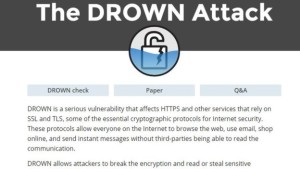
Websites have been warned they could be exposed to eavesdroppers, after researchers discovered a new way to disable their encryption protections.
The experts said about a third of all computer servers using the HTTPS protocol – often represented by a padlock in web browsers – were vulnerable to so-called Drown attacks.
They warn that passwords, credit card numbers, emails and sensitive documents could all be stolen as a consequence.
A fix has been issued.
But it will take some time for many of the website administrators to protect their systems.
Advertisement
The researchers have released a tool that identifies websites that appear to be vulnerable.
They said they had not released the code used to prove their theory because “there are still too many servers vulnerable to the attack”.
As yet, there is no evidence hackers have worked out how to replicate their technique.
An independent expert said he had no doubt the problem was real.
“What is shocking about this is that they have found a way to use a very old fault that we have known about since 1998,” said Prof Alan Woodward, from the University of Surrey.
“And all this was perfectly avoidable.
“It is a result of us having used deliberately weakened encryption, which people broke years ago, and it is now coming back to haunt us.”

Call to action
The researchers, cybersecurity experts from universities in Israel, Germany and the US as well as a member of Google’s security team, found a computer server could be vulnerable to attack just by supporting 1990s-era encryption protocol SSLv2 (Secure Sockets Layer version 2), even if in day-to-day use it employed more modern encryption standards to scramble communications.
In practice, older email servers would be more likely to have this problem than the newer computers typically used to power websites.
But many organisations reuse encryption certificates and keys between the two sets of servers.
The researchers dubbed the flaw Drown – an acronym for decrypting the Rivest-Shamir-Adleman (RSA) algorithm with obsolete and weakened encryption.
“Operators of vulnerable servers need to take action,” they wrote.
“There is nothing practical that browsers or end-users can do on their own to protect against this attack.”

Export restrictions
The SSLv2 protocol was deliberately weakened because, at the time of its creation, the US government wanted to try to restrict the availability of tough encryption standards to other countries.
It has since eased its export limits, but the effects live on.
“The problem is that while clients – such as [web] browsers – have done away with SSLv2, many servers still support the protocol,” blogged Prof Matthew Green, from Johns Hopkins University.
“In most cases this is the result of careless server configuration.
“In others, the blame lies with crummy and obsolete embedded devices that haven’t seen a software update in years – and probably never will. ”
Quick attack
To mount a successful attack on a website would still require a considerable amount of computational force.
But, the researchers said, under normal circumstance, hackers could rent the required capacity from Amazon’s cloud compute division for as little as $440 (£314).
In addition, because many of the servers vulnerable to Drown were also affected by a separate bug, a successful attack could be carried out using a home computer.
“This form of the attack is fast enough to allow an online man-in-the-middle style of attack, where the attacker can impersonate a vulnerable server to the victim,” the researchers wrote.
“We were able to execute this form of the attack in under a minute on a single PC.”
The researchers said many popular sites – including ones belonging to Samsung, Yahoo and a leading Indian bank – appeared to be vulnerable.
Prof Woodward said the team’s test had also indicated a problem with bbc.co.uk.
“The weakness is actually in the old Pop3 server,” he said.
“Few people still use Pop3, but it means that things like your password reset server could theoretically be eavesdropped upon.”
bbc




























